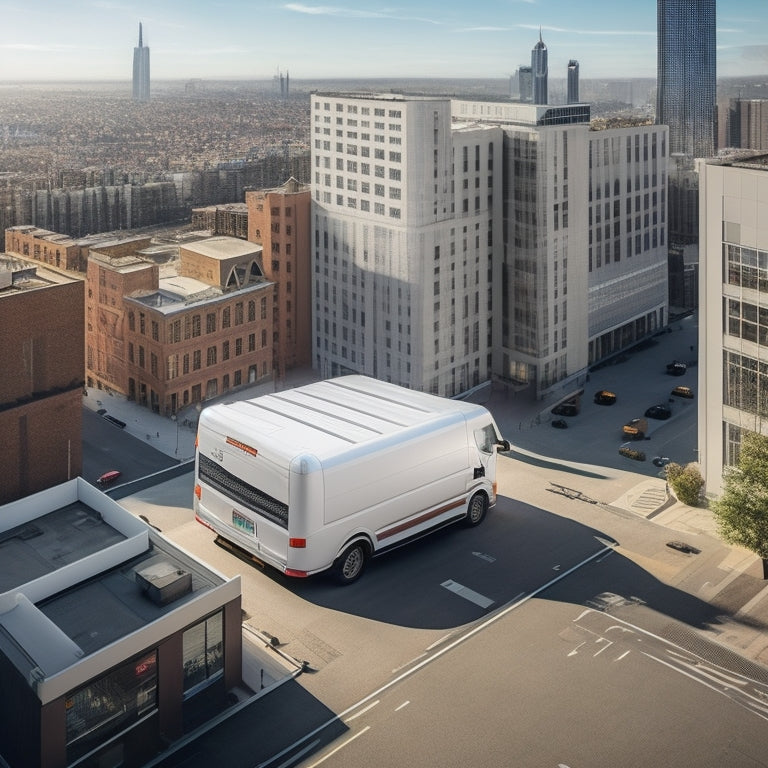
Buy Commercial Vehicle Solar Panels Online: A Guide
Share
You're looking to upgrade your commercial fleet with solar panels, a smart move that can reduce operating costs, minimize carbon footprint, and enhance your brand's environmental reputation. When buying commercial vehicle solar panels online, consider factors like panel durability, energy output, and temperature coefficient to guarantee peak performance. You'll also need to evaluate your fleet's energy requirements, assess available roof space, and choose a reputable brand. By making informed decisions, you can optimize your solar panel system and start reaping the benefits of clean energy. Now, take the next step towards a more sustainable fleet operation.
Key Takeaways
• Prioritize panel durability and energy output when selecting commercial vehicle solar panels for consistent energy supply.
• Consider factors like temperature, shading, and angle of incidence to optimize energy production and prevent efficiency loss.
• Choose a reputable brand offering durable panels with a comprehensive warranty, such as Renogy, HQST, or Windynation, for a reliable energy solution.
• Ensure proper system sizing by calculating energy requirements, evaluating available roof space, and conducting energy audits for efficient energy harvesting.
• Regular maintenance, including daily inspections, battery maintenance, and panel cleaning, is crucial for optimal system performance and longevity.
Benefits of Solar Panels for Fleets
By integrating solar panels into your fleet's vehicles, you can greatly reduce your operating costs and carbon footprint, ultimately boosting your bottom line and environmental credibility. As a fleet operator, you're constantly looking for ways to minimize expenses and maximize efficiency. Solar panels can help you achieve just that.
By harnessing the power of the sun, you can reduce your reliance on fossil fuels, leading to significant fuel savings. According to estimates, solar panels can help you save up to 20% on fuel costs, depending on your fleet's usage and routes.
Beyond the financial benefits, solar panels also have a positive environmental impact. By reducing your fleet's carbon emissions, you'll not only contribute to a cleaner environment but also enhance your brand's reputation as an environmentally responsible business.
With solar panels, you can reduce your fleet's greenhouse gas emissions, helping to combat climate change and air pollution. By investing in solar panels, you'll be taking an important step towards a more sustainable future for your business and the environment.
Choosing the Right Solar Panel
With your fleet's solar panel integration underway, you're now faced with selecting the right solar panel to maximize your fuel savings and environmental benefits. Choosing the right solar panel is essential to guaranteeing peak energy output and a safe, reliable operation.
When evaluating solar panels, prioritize panel durability as a top concern. A robust solar panel can withstand harsh weather conditions, ensuring consistent energy output and minimizing the risk of system failure. Look for panels with a sturdy frame, tempered glass, and a waterproof design to ensure a long lifespan.
Energy output is another critical aspect to examine. Evaluate your fleet's energy requirements and choose a solar panel that can meet those needs. Consider the panel's wattage, voltage, and amperage ratings to ensure it can provide the necessary power. A higher energy output may require a larger or more efficient solar panel.
Factors Affecting Solar Panel Efficiency
When evaluating the performance of your commercial vehicle's solar panels, it's crucial to understand the factors that impact their efficiency.
It's important to investigate how temperature, shading, and angle of incidence affect your panels' ability to generate power.
Panel Temperature Impact
How drastically can high temperatures slash your solar panel's energy output? As a commercial vehicle owner, understanding the impact of temperature on your solar panel's efficiency is important. High temperatures can greatly reduce your solar panel's energy output, and it's vital to mitigate this effect.
Heat resistance and thermal conductivity play a significant role in determining your solar panel's temperature coefficient. A solar panel with high heat resistance will perform poorly in high-temperature conditions, leading to decreased energy output. On the other hand, a solar panel with high thermal conductivity can efficiently dissipate heat, minimizing the impact of high temperatures on energy output.
When buying commercial vehicle solar panels online, look for products with high thermal conductivity and low heat resistance. This will ensure that your solar panel maintains its energy output even in hot weather conditions.
A high-quality solar panel with effective thermal management can make a notable difference in your energy output, ensuring you get the most out of your investment.
Shading Effects Explained
Shading effects can greatly reduce your commercial vehicle solar panel's energy output, and identifying the sources of shading is important to maximizing efficiency. As you install your solar panels, it's important to take into account the surrounding environment to minimize shading.
One common source of shading is tree canopies. If your vehicle is parked under a tree, the leafy branches can cast shadows on your panels, reducing their energy output. You can mitigate this by parking in an open area or trimming nearby branches.
Cloud coverage is another significant factor affecting your solar panel's performance. Thick clouds can block sunlight, reducing the energy your panels can generate. While you can't control the weather, you can plan your route and parking spots to maximize sunlight exposure.
For instance, parking in a southern-facing direction can help your panels receive more direct sunlight. To optimize your solar panel's energy output, it's important to assess the surrounding environment and adjust your parking strategy accordingly.
Angle of Incidence
Your commercial vehicle's solar panel efficiency is greatly influenced by the angle of incidence, which refers to the angle at which sunlight hits the panel's surface. This angle can have a substantial impact on the amount of energy your solar panel produces. When the sun's rays hit the panel at an ideal angle, the energy output increases. However, if the angle is too shallow or too steep, energy production decreases.
To maximize energy output, it is crucial to take into account the critical tilt of your solar panel. The critical tilt is the angle at which the panel receives the most direct sunlight, resulting in optimal energy production.
Here's a breakdown of recommended angles for different latitudes:
| Latitude | Recommended Angle |
|---|---|
| 0°-23.5° | 10°-20° |
| 23.5°-35° | 20°-30° |
| 35°-50° | 30°-40° |
| 50°-60° | 40°-50° |
| 60°-90° | 50°-60° |
Keep in mind that these are general guidelines, and the recommended angle may vary depending on your specific location and solar panel installation. By adjusting the angle of incidence, you can ensure that your commercial vehicle's solar panel operates at its peak performance.
Installing Solar Panels on Vehicles
When installing solar panels on your commercial vehicle, you'll need to take into account several key factors to guarantee a successful integration.
You'll have to decide on a suitable mounting option that meets your vehicle's unique requirements, determine the energy needs of your onboard systems, and accurately size your solar panel system to meet those needs.
Solar Panel Mounting Options
You'll need to take into account several factors when selecting a mounting system for your commercial vehicle's solar panels. These include the roof's size and shape, the panel's weight and size, and the vehicle's intended use. A vital and essential mounting system is important to guarantee the safety of your vehicle, passengers, and other road users.
When choosing a mounting system, consider the following options:
-
Roof racks: These provide a solid foundation for your solar panels and can be customized to fit your vehicle's roof shape and size.
-
Clamp systems: These offer a secure and adjustable way to attach your solar panels to the roof, allowing for easy installation and removal.
-
Track-based systems: These provide a flexible and adaptable mounting solution, allowing you to adjust the panel's angle and position to optimize energy generation.
Vehicle Energy Requirements
Before installing solar panels on your commercial vehicle, determining the vehicle's energy requirements is crucial to guarantee the solar panel system can meet the power demands of onboard equipment and appliances. You need to calculate the total power consumption of all devices, including lights, refrigeration units, and communication systems, to confirm that your solar panel system can provide sufficient energy.
To do this, you'll need to identify the energy demands of each device, including their wattage and operating hours. This will give you a clear picture of your vehicle's overall power consumption. Take into account the maximum energy requirements during peak usage periods, such as during nighttime operations or in extreme weather conditions.
Accurately evaluating your vehicle's energy requirements will help you choose the right solar panel system that can meet your power needs. Failing to do so may result in inadequate power supply, leading to equipment malfunctions or even safety risks.
System Sizing Considerations
With your vehicle's energy requirements calculated, you can now focus on sizing a solar panel system that meets those needs, taking into account the available roof space, desired charging time, and battery capacity. This is a critical step to make sure your solar panel system can efficiently recharge your batteries and power your appliances.
To determine the ideal system size, consider the following key factors:
-
Load calculations: Calculate the total energy consumption of your appliances and devices to determine the required solar panel output.
-
Available roof space: Assess the available space on your vehicle's roof to determine the maximum solar panel size that can be installed.
-
Energy audits: Conduct an energy audit to identify opportunities to reduce energy consumption and optimize your system's performance.
Maintenance and Upkeep Essentials
Regular inspections of your commercial vehicle's solar panels are essential to ensuring peak energy harvesting and prolonging their lifespan. You should perform daily inspections to identify any issues early on. This includes checking the panels for dirt, debris, or damage, as well as ensuring all connections are secure.
| Task | Frequency |
| Daily Inspections | Daily |
| Battery Maintenance | Weekly |
| Panel Cleaning | Bi-Weekly |
| System Performance Check | Monthly |
Daily inspections will help you catch any potential issues before they become major problems. You should also prioritize battery maintenance, as a well-maintained battery is critical for efficient energy storage. By following this maintenance schedule, you'll be able to guarantee your commercial vehicle's solar panels are running at their best. Remember, a well-maintained system is a safe and efficient one.
Top Brands for Commercial Solar Panels
When choosing solar panels for your commercial vehicle, you'll want to explore trusted brands that offer high-quality products and reliable performance. A thorough brand comparison is crucial to make sure you get the best fit for your needs.
Here are three top brands to contemplate:
-
Renogy: Known for their durable and efficient solar panels, Renogy offers a 25-year warranty on their products. Their commercial solar panels are designed to withstand harsh weather conditions and provide consistent energy output.
-
HQST: HQST offers a range of commercial solar panels with high-efficiency cells and a 25-year warranty. Their products are designed for easy installation and maintenance, making them a popular choice for commercial vehicle owners.
-
Windynation: Windynation provides high-quality commercial solar panels with a 25-year warranty. Their products are designed for rugged use and come with a range of accessories for easy installation.
When comparing brands, contemplate factors such as warranty options, product durability, and customer support. By choosing a reputable brand, you can secure a safe and reliable energy solution for your commercial vehicle.
Frequently Asked Questions
Can I Use Any Type of Battery With Solar Panels?
When choosing a battery for solar panels, you'll want to opt for a Deep Cycle battery, ensuring peak Battery Efficiency; incompatible batteries can lead to system failure, so select wisely to guarantee safety and performance.
Do Solar Panels Work During Nighttime or Low-Light Conditions?
You'll find that solar panels don't generate energy during nighttime, but with Energy Storage systems, you can store excess energy for later use. Low Light Technology and Power Optimization help maximize output, and Nighttime Charging from the grid or batteries guarantees a steady supply.
Are Solar Panels Affected by Vehicle Speed or Movement?
As you consider solar panels on your vehicle, you'll want to know that wind resistance and turbulent air caused by speed can induce panel vibrations, but most systems are designed to withstand these forces, with aerodynamic design ensuring stability above certain speed thresholds.
Can I Install Solar Panels on a Leased Vehicle?
Before installing solar panels on a leased vehicle, you'll need to review your lease agreements to confirm modifications are allowed, and consider insurance implications to avoid potential penalties or coverage issues.
Do Solar Panels Void a Vehicle's Warranty?
When you install solar panels on your vehicle, you won't automatically void the warranty, but modifications can trigger manufacturer liability and warranty exemptions under federal regulations, so review your contract carefully.
Related Posts
-

Why Choose Recycled Paper for Earth-Conscious Business?
By choosing recycled paper, you'll greatly reduce your business's environmental impact. You'll lower your carbon foot...
-

Why EVs Inspire Earth-Conscious Home Design Choices
As you shift to an electric vehicle, you're not just switching to a greener ride, you're igniting a broader commitmen...
-

Gamify Your Home's Energy Generation and Savings
You're taking the next step in optimizing your home's energy generation and savings by utilizing the power of gamific...


